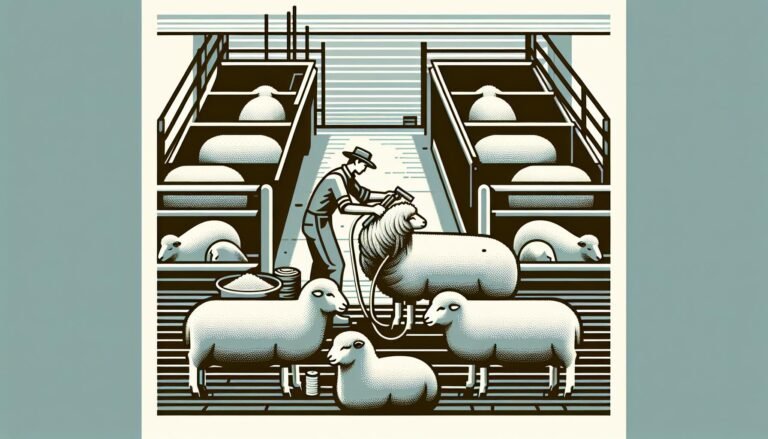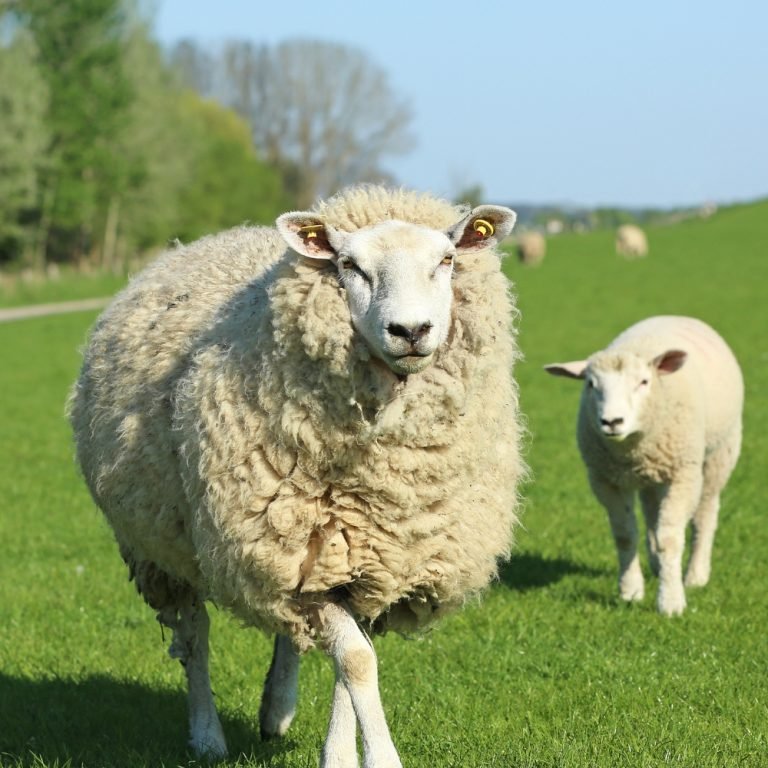Decoding the Olfactory Mystery: Do Sheep Really Smell Bad?
Ever walked past a flock of sheep and wondered, “Do sheep smell bad?” It’s a question that’s crossed many minds, especially those of us who live near or work with these woolly creatures.
Sheep, like any animals, have their unique scent. However, whether it’s unpleasant or not can depend on several factors. From their diet to their living conditions, a multitude of elements can influence how a sheep might smell.
In this article, we’ll dive into the world of sheep and their odors. We’ll explore the reasons behind their smell, and whether it’s something you should be concerned about. So, if you’ve ever found yourself curious about the aromatic attributes of sheep, you’re in the right place.
Key Takeaways
- Sheep have a unique smell due to various factors such as diet, wool condition, living conditions, and the release of pheromones for communication and mating purposes.
- The diet of sheep significantly influences their smell. Sheep that feed on fresh green pastures like grass and clover tend to emit a milder odor compared to those predominantly fed silage, a fermented vegetation type that results in a significantly stronger, distinct smell.
- A sheep’s wool condition and cleanliness, impacted by their living conditions, plays a crucial role in their scent. Wool collects dirt, sweat, and oil over time, which can intensify their scent, especially in poorly ventilated and unclean living environments.
- Sheep release pheromones for communication, particularly during mating seasons, which can also add to their distinctive smell.
- Though distinctive, the smell of sheep is typically not a cause for alarm. It’s an idiosyncrasy that comes with living alongside these creatures.
- The smell of sheep can be managed by appropriate considerations to their diet, maintenance of their living conditions, and understanding of their social needs. Regular cleaning of habitat, adequate ventilation, stress management, and careful control of their diet are key measures in this regard.
Reasons why sheep have a distinct smell
If you’ve ever visited a farm, you might notice that sheep have a distinctive smell. It’s not necessarily a bad odor—just, well, different. So, what causes this unique scent? Let’s explore several key factors.
Diet plays a pivotal role in the odor of a sheep. You are what you eat, right? With sheep, it’s no different. The scent often arises from what the sheep consume, which typically consists of pasture grasses, grains, and other vegetation.
Living Conditions can also significantly impact a sheep’s smell. Sheep that live in well-maintained environments with plenty of room to roam will generally smell less than those that are kept in crowded or unclean circumstances. Take note of the housing facilities and grooming habits; these factors, too, influence the scent.
Wool is yet another aspect to consider. Wool can collect dirt, sweat, and oil over time, resulting in a unique smell. Wooly breeds tend to smell stronger due to the nature of their coats locking in these elements.
There’s also the factor of pheromones. Sheep, like many other animals, release pheromones for communication and mating purposes. These chemical signals add another dimension to the sheep’s overall smell.
Sheep aren’t all that unique in having their own odor, almost every animal does. But it’s this variety of factors that make up the distinct smell of sheep.
Keep in mind, these factors don’t necessarily mean the smell is bad, just that it’s unique to these fleecy animals.
Of course, no one wants a farm or backyard that reeks. If you’re planning on becoming a breeder or raising sheep as pets, it’s important to consider these aspects to mitigate any potential smells. Understanding the reasons will help you appreciate the scent rather than see it as a problem.
Next, we’ll delve into ways to manage and minimize the distinctive smell of sheep. But, rest assured, a sheep’s smell is usually nothing to worry about. In fact, some folks find it rather comforting.
Factors that influence the smell of sheep
Wool and Living Conditions
I cannot stress enough that the wool of a sheep plays a significant role in the distinctive smell. Wool has its unique oil, lanolin, which helps keep the wool waterproof, but it also contributes to the smell.
Then there’s their living conditions. Sheep that are kept in cleaner environments with plenty of fresh air tend to smell less intense than those kept in closed, poorly ventilated areas. This is simply because dirt and perspiration get trapped in the wool in an unclean setting.
Diet Influence
Diet is another crucial factor influencing sheep’s smell. What a sheep eats directly affects its odor. For instance, if a sheep’s diet consists primarily of silage, the sheep tends to give off a stronger smell. On the other hand, those who graze on grass and clover generally have a milder odor. I’ve found that managing a sheep’s diet carefully can have a pronounced effect on the scent.
| Diet Type | Intensity of Smell |
|---|---|
| Grass and Clover | Milder |
| Silage | Stronger |
Role of Pheromones
Finally, let’s not overlook the importance of pheromones. These chemical signals, naturally produced by animals, play a big part in communication among sheep, especially during mating seasons. Naturally, they tend to emit stronger smells during these times, serving as a call to potential mates.
Understanding these elements and considering them in sheep care can significantly affect the intensity of the unique smell. Though remember, no sheep aroma is a cause for concern. Rather, it’s an idiosyncrasy that comes with living alongside these wonderful creatures.
Diet and its impact on sheep’s odor
A crucial component that influences a sheep’s smell is its diet. Known for their diverse and seemingly insatiable appetite, what sheep consume can distinctly impact their odor. Grass-eaters versus silage eaters is indeed a case worth demonstrating.
Sheep that spend their days munching on fresh green pastures produce an odor that tends to be less pronounced. Grass and clover, known for their clean, crisp aroma, play a significant role in lending a mild smell to these sheep. Such a diet makes them less likely to manifest a pungent scent.
On the other hand, sheep predominantly fed silage have been found to carry a much stronger, distinct smell. Silage, a fermented vegetation type used as fodder, can have a robust and unique odor. Its intake magnifies in the sheep’s scent by being metabolized and exuded through their wool and skin.
Variety is another key aspect of sheep diet that can affect their smell. The more varied a diet is, the more complex the resulting odor. Sheep with a diverse diet that includes a mix of grains, hay, supplements, and pasture often exhibit a more complex, nuanced smell.
In practical terms, this means managing a sheep’s odor might come down to simply controlling their diet. By choosing the elements of their food consumption, from the greenness of their pastures to the mix of feeds and supplements, you can somewhat temper their inherent scent.
It’s an interesting interplay between a sheep’s diet and their smell, a dance of sensory experience as unique as each individual sheep. While not a cause for alarm, keeping an eye on what your sheep consume can contribute to managing their smell in a more controlled manner. Every shepherd must know this crucial aspect of sheep rearing and should consider different diets based on their tolerance towards sheep’s distinct odor.
Living conditions and their effect on sheep’s scent
A significant aspect that impacts a sheep’s scent, beyond diet and wool, is their living conditions. It’s intriguing, yet accurate, to note that there are environmental influences, both physical and social, that effectively modify a sheep’s smell.
Primarily, it’s crucial to understand the role of ventilation. Sheep living in open, well-ventilated areas tend to emanate a less intense smell. Fresh air acts as a natural deodorizer for sheep, minimizing the concentration of their distinct odor in the surrounding environment. Contrastingly, in closed, poorly ventilated spaces, dirt and perspiration get trapped in the wool. This provides a breeding ground for bacteria, and these microorganisms in the sheep’s wool are largely responsible for the pungent smell associated with sheep.
When looking at other physical aspects like cleanliness, it becomes apparent that a clean living environment is a key deterrent of strong smells. Regular cleaning of stalls and removal of fallen wool can prevent the buildup of unwanted odors. Incorporating these simple habits in their routine can make a noticeable difference in the living conditions and consequentially, the odor of a sheep flock.
Lastly, social factors aren’t to be overlooked either. Sheep are herd animals, thriving in groups. A sheep isolated from its herd might experience stress or anxiety that can contribute to a stronger odor. Thus, it’s not just about tangible factors like ventilation and cleanliness, but it’s also the intangible, like sense of security that has its sway over a sheep’s scent.
As seen thus far, various aspects intertwining sheep’s living conditions and its odor have been brought to light. We are yet to delve deeper into the correlation between these factors and how one could counterbalance the smell, depending on how tolerant they are towards it. Interesting details are about to unfold as we further dissect the distinct sheep smell. While it’s evident that there’s no one-size-fits-all solution to controlling this natural scent, a fine balance of many factors can help achieve the desirable results.
How to manage the smell of sheep
Understanding the factors that influence a sheep’s smell, it’s now important to turn our focus to methods of managing this issue. Raising sheep comes with its own unique challenges, one of which – you’ve guessed, is odor. It’s not insurmountable though. With the right strategies, you can lessen the intensity of the odor and maintain a pleasant environment.
Diet stands out as one of the key aspects of sheep management. Sheep fed on a diet abundant in fresh pasture have a less potent odor in comparison to those fed on commercially processed feeds. Maintaining a natural diet for your flock can therefore significantly reduce the smell. It’s also worthwhile noting that sheep should always be provided with a fresh water source. Keeping sheep well-hydrated conduces to their broader health, and will, in turn, contribute to reducing unpleasant aromas.
The living conditions, more specifically, ventilation and cleanliness, play a significant role in managing sheep smell. Sheep housed in open, well-ventilated areas have a markedly less intense odor – this is thanks to the circulation of fresh air, which dispels odors and keeps the sheep drier, preventing the buildup of sweat and dirt in the wool. Inadequate ventilation causes dampness and encourages the breeding of bacteria, escalating the smell level. Regular cleaning of the housing and pasture also curbs odor development.
Lastly, social factors can’t be overlooked. Stress, linked to herd dynamics and a lack of security, can prompt stronger odors in sheep due to increased perspiration. Handling these social issues with the proper care can go a long way in managing the smell of your flock.
Adopting these preventative measures will certainly alleviate the sheep smell, albeit not completely erase it. Nonetheless, armed with this knowledge, you’re now better equipped to handle the task. The journey to raising well-adjusted, not-overly-smelly sheep is well underway. Let’s delve further into this peculiar world of our odoriferous woolly friends.
Conclusion
So, do sheep smell bad? It’s not a simple yes or no. The smell of sheep can vary greatly based on factors like diet, living conditions, and social dynamics. Proper management and care can significantly reduce any unpleasant odors. If you’re a sheep owner or handler, it’s essential to maintain good hygiene, provide a well-ventilated environment, and ensure a balanced diet for your flock. By doing so, you’ll not only keep the smell in check but also contribute to the overall health and well-being of your sheep. Remember, a happy, healthy sheep is less likely to have a strong, unpleasant smell.







